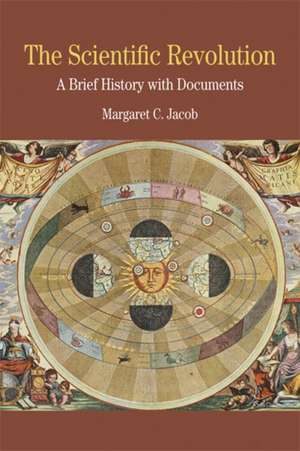The Scientific Revolution: A Brief History with Documents: Bedford Series in History and Culture
Autor Margaret C. Jacoben Limba Engleză Paperback – 30 noi 2009
Preț: 198.10 lei
Nou
Puncte Express: 297
Preț estimativ în valută:
37.91€ • 41.17$ • 31.85£
37.91€ • 41.17$ • 31.85£
Cartea nu se mai tipărește
Doresc să fiu notificat când acest titlu va fi disponibil:
Se trimite...
Preluare comenzi: 021 569.72.76
Specificații
ISBN-13: 9780312653491
ISBN-10: 0312653492
Pagini: 176
Dimensiuni: 137 x 206 x 10 mm
Greutate: 0.18 kg
Editura: BEDFORD BOOKS
Seria Bedford Series in History and Culture
Locul publicării:New York, United States
ISBN-10: 0312653492
Pagini: 176
Dimensiuni: 137 x 206 x 10 mm
Greutate: 0.18 kg
Editura: BEDFORD BOOKS
Seria Bedford Series in History and Culture
Locul publicării:New York, United States
Descriere
This volume by Margaret C. Jacob explores the Scientific Revolution from its origins in the early sixteenth century to its widespread acceptance in Western societies in the late eighteenth century. Jacob's introduction outlines the trajectory of the Scientific Revolution and argues that the revival of ancient texts in the Renaissance and the upheaval of the Protestant Reformation paved the way for science. The collected documents include writings of well-known scientists and philosophers, such as Nicolaus Copernicus, Francis Bacon, Galileo Galilei, Rene Descartes, and Isaac Newton, as well as primary sources documenting innovations in medicine and engineering, advances in scientific investigations, and the popularization of the scientific revolution through academies and their journals. Document headnotes, questions for consideration, a chronology, and a selected bibliography support students' study of the Scientific Revolution.
Cuprins
ForewordPrefaceList of IllustrationsPART ONE: INTRODUCTION: THE EVOLUTION AND IMPACT OF THE SCIENTIFIC REVOLUTIONWhy Did the Scientific Revolution Happen?Aristotle Ptolemy, and their Early Modern DefendersExploration and Technical InnovationThe Emergence of the Scientific RevolutionThe New ScienceThe Mechanical PhilosophyNewtonian ScienceReconciling, Science, Religion, and MagicSpreading the Scientific RevolutionConclusion: The Long Road to AcceptancePART TWO: THE DOCUMENTSNicolaus Copernicus, On the Revolution of the Heavenly Orbs, 1543Francis Bacon, The Advancement of Learning, 1605Francis Bacon, The Great Instauration, 1620Galileo Galilei, The Starry Messenger, 1610William Harvey, On The Motion Of The Heart And Blood In Animals, 1628René Descartes, Discourse on Method, 1637Robert Boyle, New Experiments Physico-Mechanical, 1660Robert Boyle, A Free-Enquiry into the Vulgarly Received Notion of Nature, 1686Anthony van Leeuwenhoek, Of the Formation of the Teeth in Several Animals; the Structure of the Human Teeth Explained, 1683Isaac Newton, Letter to Philosophical Transactions of the Royal Society, 1672Isaac Newton, Selections from Principia, 1687 Isaac Newton, Thirty-first Query to the Opticks, 1718Christiaan Huygens, The Celestial Worlds Discovered, 1698Maria Sibylla Merian, Letter of 1702Maria Sibylla Merian, Butterfly, Hawk-moth, Caterpillar Philosophical Transactions of the Royal Society, 1713-14Jean Desaguliers, Physico-Mechanical Lectures, 1717Benjamin Franklin, Experiments and Observations on Electricity Made in Philadelphia in America, 1751AppendixesA Chronology of the Scientific Revolution (1514-1752)Questions for ConsiderationSelected BibliographyIndex
Notă biografică
MARGARET C. JACOB (Ph.D., Cornell University) is Professor of History at the University of California, Los Angeles, USA. She has published widely on science, religion, the Enlightenment, freemasonry, and the origins of the Industrial Revolution. Her first book, The Newtonians and the English Revolution (1976), won the Gottschalk Prize from the American Society for Eighteenth Century Studies. Her most recent monograph is Strangers Nowhere in the World: The Rise of Cosmopolitanism in Early Modern Europe (2006).
Caracteristici
Jacob's introduction outlines the trajectory of the Scientific Revolution and argues that the revival of ancient texts in the Renaissance and the upheaval of the Protestant Reformation paved the way for science
The collected documents include writings of well-known scientists and philosophers, such as Nicolaus Copernicus, Francis Bacon, Galileo Galilei, Rene Descartes and Isaac Newton
Document headnotes, questions for consideration, a chronology, and a selected bibliography support students' study of the Scientific Revolution
The collected documents include writings of well-known scientists and philosophers, such as Nicolaus Copernicus, Francis Bacon, Galileo Galilei, Rene Descartes and Isaac Newton
Document headnotes, questions for consideration, a chronology, and a selected bibliography support students' study of the Scientific Revolution





